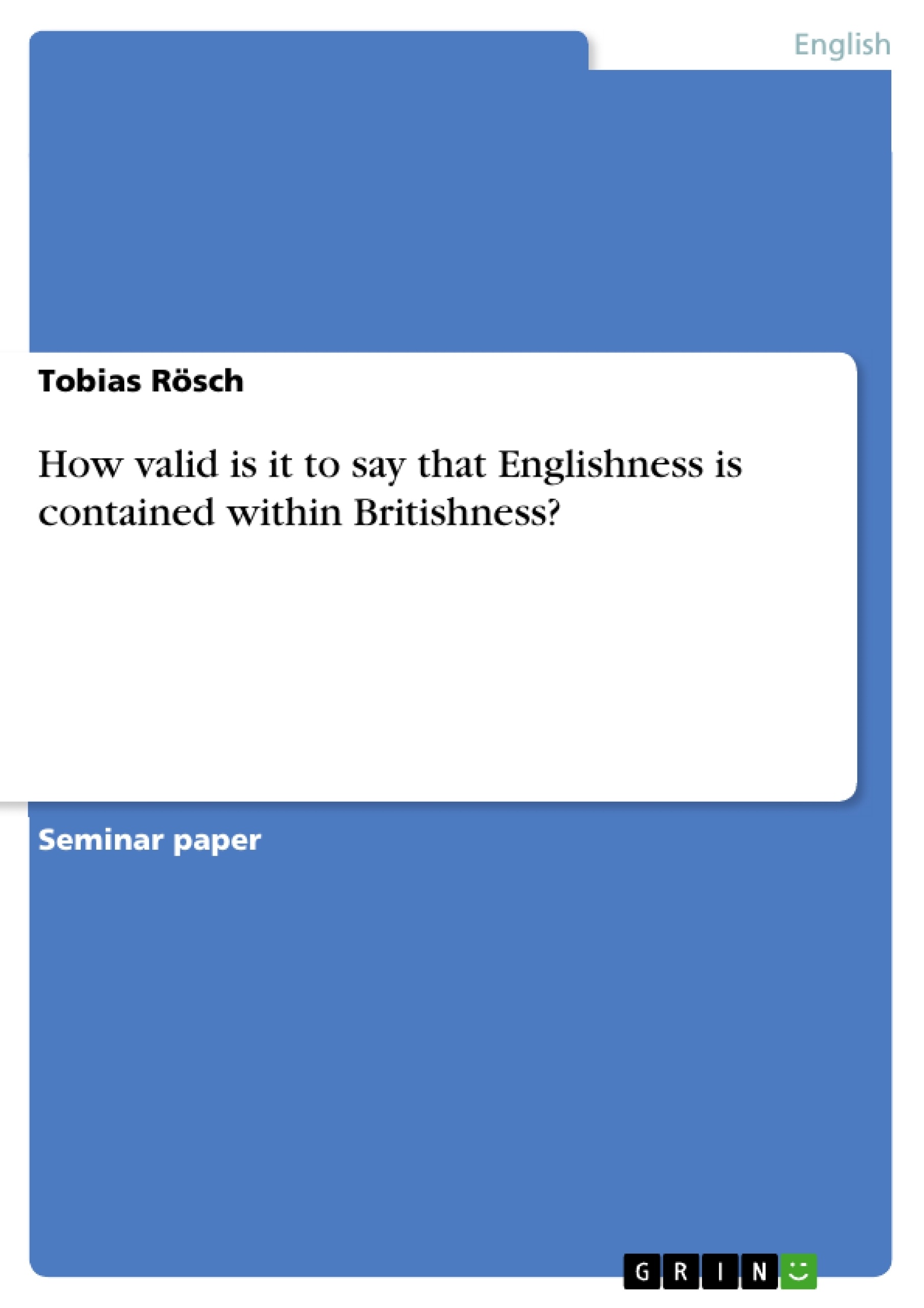While Scotland and Wales slowly dissociate from a community that had served its purpose in times of crisis (among them World War I and II, and, more recently, the Falkland War of 1982) as well as in the global context of the British Empire, England is left with a dilemma: Before the backdrop of a potential division of Britain, how can the English reinvent themselves and find their own specific identity? This paper will be concerned with English identity and shed some light on the question of whether or not we can speak of Britishness as incorporating a specific notion of Englishness. When in 1997 a majority of the Scottish public voted in favour of forming a Scottish Parliament endowed with its own (limited) legislative competence, it became increasingly clear that Britain would undergo a process of national transformation in the years to come that would change the country irrevocably. The shadow of devolution had fallen over what has always been the political and economic pivot of the Union: Looming in a distance could be discerned the first harrowing signs of a disintegration that would gradually weaken national cohesion within Britain and sever the bonds that had held the nation together for more than three centuries. In 1707 the Kingdom of Scotland had been married to the Kingdom of England by parliamentary acts that came to be known as the Acts of Union; historically, however, both countries had been ruled by a single monarch ever since the Union of the Crowns, dating back to 1603. Nowadays, the debate about national sovereignty is being rehashed; to many people, especially those living in the English regions, and among them a considerable number of politicians, the drastic developments are more than just a nuisance. While Scotland and Wales slowly dissociate from a community that had served its purpose in times of crisis (among them World War I and II, and, more recently, the Falkland War of 1982) as well as in the global context of the British Empire, England is left with a dilemma: Before the backdrop of a potential division of Britain, how can the English reinvent themselves and find their own specific identity?
Inhaltsverzeichnis (Table of Contents)
- How valid is it to say that Englishness is contained within Britishness?
- English Identity – A Nation in Transition
- Race and National Identity
- Britishness – A Notion that is Still Debated
- Englishness – Towards a Definition?
- England – A Land of Contradictions
- The Role of History in National Identity
- The Notion of “Merry England”
- The “Thomas Theorem” – A Fictional Reality
- A National Myth that has Survived for Centuries
Zielsetzung und Themenschwerpunkte (Objectives and Key Themes)
This paper analyzes the relationship between Englishness and Britishness, exploring whether English identity can be considered a component of British national identity. The paper examines the historical and contemporary factors influencing both concepts, including devolution, the role of history in national identity, and the impact of multiculturalism.
- The evolving nature of British national identity in the context of devolution
- The relationship between Englishness and Britishness, including their historical development and current perceptions
- The influence of race, culture, and history in shaping national identities
- The significance of shared cultural heritage, language, and historical narratives in defining national identity
- The role of stereotypes and myths in constructing and reinforcing national identities
Zusammenfassung der Kapitel (Chapter Summaries)
- The paper begins by outlining the historical context of the debate regarding Englishness and Britishness, emphasizing the changing dynamics within the United Kingdom, particularly in light of devolution.
- The second chapter analyzes the concept of national identity, exploring the complexities of defining it in a multicultural world. The paper discusses the potential limitations of using race as a defining factor for national identity.
- The third chapter focuses on the debate surrounding British national identity, presenting evidence that suggests differing perceptions of Britishness among different regions within the United Kingdom.
- The fourth chapter delves into the concept of Englishness, exploring its historical and cultural associations and attempting to define its key characteristics.
- Chapter five explores the significance of history in shaping national identities, particularly focusing on the concept of “Merry England” and its influence on English self-perception.
- The final chapter discusses the role of social constructs and the "Thomas Theorem" in influencing national identity, highlighting the impact of shared narratives and perceptions on a nation's sense of belonging.
Schlüsselwörter (Keywords)
The text focuses on key concepts such as Englishness, Britishness, national identity, devolution, multiculturalism, cultural heritage, history, and stereotypes. It explores the complex relationship between these concepts and their influence on individual and national identities.
Frequently Asked Questions
What is the difference between Englishness and Britishness?
Britishness is a collective identity encompassing the UK (England, Scotland, Wales, Northern Ireland), while Englishness refers specifically to the cultural and national identity of England.
How has devolution affected British national identity?
Devolution has led Scotland and Wales to dissociate more from a unified British identity, forcing England to reinvent its own specific identity within the Union.
What is the concept of "Merry England"?
"Merry England" is a national myth or nostalgic vision of a past English society that was idyllic, rural, and socially cohesive, significantly influencing English self-perception.
What was the significance of the 1707 Acts of Union?
The Acts of Union legally joined the Kingdom of Scotland and the Kingdom of England into a single sovereign state, the Kingdom of Great Britain.
How does multiculturalism impact national identity in Britain?
Multiculturalism challenges traditional definitions of national identity based on race, leading to a more complex debate about shared cultural values and heritage.
- Citar trabajo
- Tobias Rösch (Autor), 2007, How valid is it to say that Englishness is contained within Britishness?, Múnich, GRIN Verlag, https://www.grin.com/document/94326



